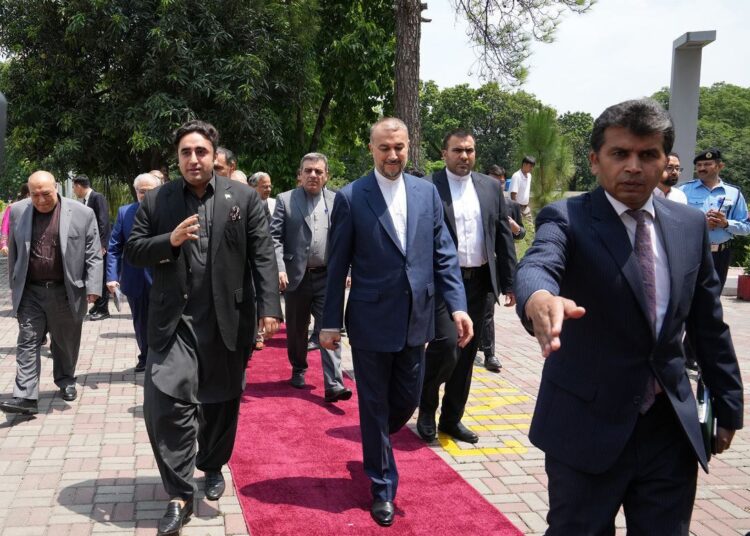The probing inquiry of how to circumnavigate the influence of “others” within the Iranian-Pakistani relationship signifies a preeminent concern. It is imperative for both Tehran and Islamabad to surmount this obstacle strategically; it could become the cornerstone in fostering relations at an expedited pace.
By Abas Aslani
Bearing great potential, the Iranian-Pakistani relationship stands poised to evolve into a vast connection. Notwithstanding, this bond perennially grapples with ups and downs spanning economic, political, diplomatic and military aspects. Despite a plethora of commonalities engendering a natural convergence between Tehran and Islamabad, divergent elements within their interrelationship persistently occupy an undeniable prominence. Nevertheless, geopolitical necessities have consistently forestalled total collapse of the Iranian-Pakistani amity. As such, it remains viable to neutralize these divisive factors through an efficacious neighborhood policy strategy and an enhancement of their economic-commercial interactions. Iran’s foreign minister’s ongoing diplomatic visit to Pakistan may be assessed in this context.
Tehran-Islamabad divergence factors
Central to the Iranian-Pakistani dynamic, as with manifold other foreign relations of Iran, dwells the impact of external factors. In the bilateral relationship of Tehran and Islamabad, both Western and Eastern influences, ranging from China and India to the Arab nations of the region, exert significant persuasion.
In the course of the Afghanistan war, the United States’ financial and military assistances to Pakistan emerged as a pivotal determinant of the Tehran-Islamabad relationship. Recent times, however, have witnessed a surge in Eastern influences. Iran’s inclination towards collaboration with India exists in stark contrast to Pakistan’s perspective of India, perceived predominantly as a competitor due to historical, geopolitical and political contexts. Concurrently, China’s increasing sway in Pakistan creates further intricacies in the Chabahar-Gwadar puzzle. Such geostrategic computations are exceedingly potent, rendering potential concerns like Afghanistan and the roles of other regional actors like Saudi Arabia and the UAE secondary in nature.
The potentiation of these extra factors upon the divergence in relations between Tehran and Islamabad is further catalyzed by the prevailing security perceptions amongst the nations’ decision makers. A sizable portion of the hurdles precluding enhancement in the Iranian-Pakistani relationship can be attributed to this defense and security related perceptions. Predominantly, security and intelligence institutions are relatively the key decision-making bodies affecting Iranian-Pakistani relations.
Pakistan’s political fabric is an intricate web encompassing party rivalries, conventional allegiances, and military interventions. As a result, Tehran consistently exercises caution in its policies towards Pakistan’s political groups and parties. Additionally, the country’s intelligence and security infrastructure leverages proxy groups in certain regional policies.
Iran views the operations of anti-Iranian terrorist groups in Pakistan with notable cynicism. Viewed through this lens, the insufficient intelligence oversight of Pakistan’s Intelligence Service (ISI) in border areas, along with its perceived lack of stern action against anti-Iranian groups, are amongst the chief quandaries in the Iranian-Pakistani ties.
Charting the course for strategic rapport
The Iranian-Pakistani engagement, akin to other foreign relations of Iran, languishes under the deficit of a coherent and well-articulated roadmap – and its nature is predominantly development-oriented. Framed within the context of a neighborhood policy, the Tehran-Islamabad relationship could benefit from a well-grounded program capable of mitigating the impact of adverse elements.
The bedrock of Iran’s neighborhood policy with its adjoining nations encompasses the objective to preempt political disparities from its priorities, and instead, accentuates the enhancement of economic collaborations and security convergence. Such foundational elements hold the potential to evolve into the underlying support structures of the Iranian-Pakistani relationship. An escalation in Iran and Pakistan’s economic and security significance can further contribute to neutralizing anti-Iranian terrorist groups along common borders.
The economic sector presents an array of opportunities for Iran and Pakistan to cultivate their relations. Concurrently, Pakistan’s inclination towards China could potentially serve as groundwork for tripartite economic cooperation encompassing Iran, China, and Pakistan. In this context, the Shanghai Cooperation Organization (SCO) embodies institutional capability requisite for expansion of ties between the nations. The formulation of joint regional strategies to address security challenges sprung from Afghanistan’s instability manifests yet another arena for bilateral collaboration between Tehran and Islamabad.
Employing public diplomacy and nurturing societal relations could prove instrumental in surmounting political impediments. Iran possesses substantial soft power within the Pakistani societal fabric. Measures such as simplifying visa procurement processes with Pakistan, escalating interaction between thought-leaders and intellectuals, fostering and facilitating religious and medical tourism could play a significant role in bolstering the political, economic and cultural ties threading the two countries together.






